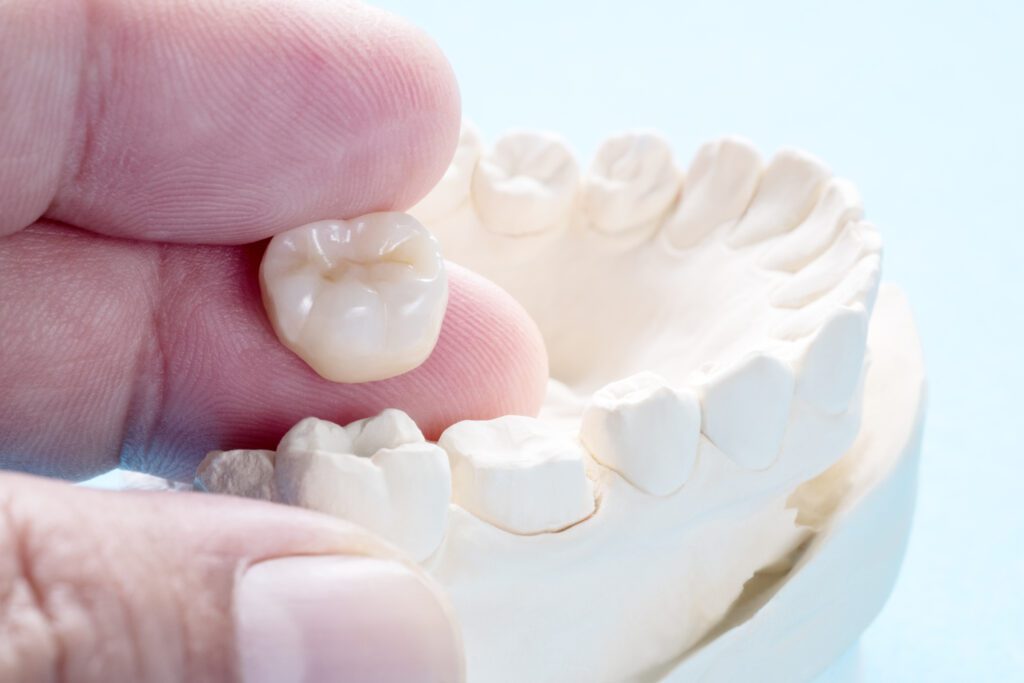Also known as dental caps, dental crowns cover single teeth. They can address damaged and broken teeth. Crowns can also treat teeth after root canals and cover single dental implants. At Best Dental Spa, we provide treatment with dental crowns in Hoffman Estates, IL. This restorative dental treatment covers natural teeth and secures dental restorations.
Dr. Dhara Patel uses CEREC for accurate digital impressions during dental crown treatment in her office. CEREC is part of the dental technology we provide in-office, allowing our team to provide effective treatment. Dental crown treatment combines technology, high-quality materials, and expert care to restore one or more teeth.

What is a Dental Crown?
A dental crown is an artificial cap that fits over an existing tooth. It will help improve the tooth’s overall appearance while also providing protection from further damage or decay. In most cases, we recommend a crown when a tooth is too weak for a filling, has severe damage from decay, or if the patient has just undergone a root canal.
The Benefits of Dental Crowns in Hoffman Estates, IL
When you think of a dental crown, you may think of a gold tooth. Traditional dental crowns are made of metal materials. While metal crowns offer durability, they do not blend in with the color of other teeth in the mouth. Metal crowns are even noticeable on the molars when speaking or eating.
Because of this, we recommend tooth-colored crowns. Porcelain ceramic crowns also provide custom-fit, durability, and tooth-colored restorations.
Dental crowns can cover large fillings, secure bridges, and cap off single dental implants. If you have a worn tooth, a crown can add support and create a more even bite. Additionally, if you receive a filling for a weakened tooth, receiving a crown can prevent further damage to your tooth.
Tooth crowns also cover large chips, cracks, or fractures. As with weakened teeth, crowns can protect teeth from future injuries and restore comfort to the bite. Treatments with dental crowns can renew tooth appearance, function, and comfort.
Treatment with Dental Crowns in Hoffman Estates, IL
If you worry about the dental crown procedure, you’re not alone! It’s a common dental procedure, but it’s also one that can cause anxiety in many patients. Fortunately, understanding the process can help ease any tension and put your mind at ease.
The process of getting a traditional dental crown will usually involve two trips to the dentist. During the first visit, Dr. Patel will prepare your tooth for the crown by cleaning and reshaping the surface. Removing a bit of the tooth structure ensures that the dental crown will fit securely onto the tooth. Dr. Patel also ensures that she removes decay from the tooth to prevent the risk of infection.
She then takes digital impressions of the tooth or teeth receiving the crown using CEREC. Chairside Economical Restoration of Esthetic Ceramics or CEramic REConstruction uses computer technology to take impressions of teeth. This software can generate a precise and quick fit. CEREC ensures that your crowns match the shape and shade of natural teeth.
Dr. Patel digitally sends specifications and impressions to a dental lab, where they will create your new crown out of porcelain or metal. In the meantime, she will cover your prepared teeth with temporary crowns.
During your second visit, Dr. Patel will fit the new crown over your existing tooth and bond it with special dental cement. She will also give you care instructions and time to ask any questions.
Feeling anxious about getting a dental crown is normal, but you don’t have to worry. With the right preparation, you can trust that our dentist will ensure your crown fits well and looks natural. You’ll enjoy all the benefits of having a healthy, strong, and attractive tooth at the end of the process.
Dental Crown Uses
Dental crowns are a common and important dental treatment used to restore damaged, weakened, or discolored teeth. They are versatile and can be used for many different dental problems.
Restoring a Damaged or Decayed Tooth
One of the most common reasons for needing a dental crown is to restore a tooth severely damaged by decay. Sometimes, a cavity can be so large that a regular filling won’t be enough to repair the tooth. In these cases, a crown can cover and protect the tooth, restoring its strength and function. The dentist will remove any decayed parts of the tooth and then place a custom-made crown over the remaining healthy part.
Protecting a Weak Tooth
Teeth can become weak for several reasons. Sometimes, they may have been worn down from grinding (bruxism) or weakened after a root canal treatment. A crown helps prevent the tooth from breaking or cracking in these situations. Crowns are strong and durable, providing long-lasting protection to a tooth that might otherwise be at risk of further damage. If you have a tooth that’s fragile or at risk of breaking, a crown can give it the extra support it needs.
Covering a Tooth After a Root Canal
A root canal is a procedure where the nerve and pulp of a tooth are removed because of infection or severe decay. After a root canal, the tooth is often hollowed out and may be too weak to function properly without additional support. A crown is placed over the tooth to protect it and restore its shape and size. Crowns after a root canal treatment also help the tooth blend in with the rest of your teeth, improving your smile.
Improving the Appearance of a Tooth
Crowns aren’t just for damaged teeth—they can also be used to improve the appearance of discolored or misshapen teeth. If you have a tooth that is chipped, cracked, or odd-shaped, a crown can be placed to give the tooth a more natural look. Porcelain or ceramic crowns, in particular, are ideal for this purpose because they can be color-matched to blend in with your natural teeth. This makes crowns popular for people who want to enhance their smile.
Supporting a Dental Bridge
A dental bridge replaces one or more missing teeth by attaching artificial teeth to adjacent natural teeth. The natural teeth on either side of the gap need crowns to securely anchor the bridge. The crowns provide support and ensure the bridge stays in position and functions like natural teeth. A bridge is a good option if you’re missing teeth but still have healthy teeth on either side of the gap.
Fixing a Large Filling
If you have a large filling in one of your teeth, it can sometimes weaken the tooth over time. A crown can be used to cover the tooth and provide extra protection. This is especially important if the tooth has a lot of filling material and little remaining natural tooth structure. Without a crown, the tooth could risk breaking or cracking under pressure. A crown restores the strength and function of the tooth, allowing you to chew and speak comfortably.
Enhancing the Function of a Tooth
Teeth need to be strong to perform everyday functions like chewing and biting. If a tooth is weak, broken, or has undergone extensive dental work, it may not be able to perform these tasks effectively. A crown restores the tooth’s function by reinforcing its structure and providing stability. This allows you to eat and speak more comfortably without worrying about damaging the tooth further.
Dental Crowns FAQs
Learn the answers to frequently asked questions about dental crowns below.
How long do dental crowns last?
Dental crowns can last patients up to thirty years with proper dental care. The permanence of your dental crown will depend on a variety of factors:
- Personal oral health: Brushing and flossing dental crowns daily will prevent bacterial buildup and keep crowns bright. Those with misaligned teeth or bruxism (teeth clenching and grinding) need corresponding treatment before receiving dental crowns.
- Professional dental care: Highly qualified dentists ensure dental crowns fit patients properly and feel comfortable.
- Dental crown material: Porcelain crowns last from five to fifteen years. Metal crowns may last longer but do not offer a natural-looking restoration.
Am I a candidate for dental crowns?
Broken teeth that still have the tooth root intact can receive dental crowns. Patients with missing teeth may also receive dental implants, dentures, bridges, and crowns. Our patients with tooth decay may need crown treatment after we remove the infection with a root canal procedure.
Is it painful to receive dental crowns?
Getting a dental crown usually involves some degree of discomfort. Our dentist must remove some natural tooth enamel to make room for the crown. However, your dentist should provide local anesthesia to reduce pain or discomfort. A local anesthetic numbs the tooth nerves and mouth, receiving the dental crown, so the procedure shouldn’t be painful. You may feel sore after the procedure, but this should pass in a few hours.
Can dental crowns fall out?
Dental crowns can come loose due to tooth damage or decay. If you notice any changes in the fit or comfort of your crown or if it falls out, contact our office immediately. We will advise you on how to address the problem, and our staff can also help you schedule an appointment.
Can dental crowns get cavities?
While the crown itself cannot decay, the tooth underneath it can develop cavities if oral hygiene is neglected. It’s important to clean around the base of the crown to prevent plaque buildup and decay at the crown’s margins.
Can I whiten a dental crown?
No, dental crowns cannot be whitened like natural teeth because they are made of materials that do not respond to whitening agents. If you are considering teeth whitening, it’s best to do so before getting a crown to ensure a color match.
Call Our Dental Office
Restore problem teeth with dental crowns in Hoffman Estates, IL. Call Best Dental Spa for comprehensive care today at 847.660.6603. You can also request an appointment with Dr. Patel online.
Please let us know if you have questions about dental crowns or your candidacy for tooth crown treatment. We’re here to help.
